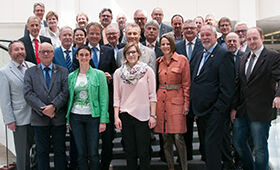“No crisis in the dual system of VET”
Düsseldorf Chamber of Crafts and Trades visit the BIBB
06.06.2016
Academisation, inter-company vocational training centres, and digitalisation were the central themes discussed in an exchange of views during a visit by leading representatives of the Düsseldorf Chamber of Crafts and Trades to the BIBB.

In a speech to the board and management of the Düsseldorf Chamber of Crafts and Trades, the President of the Federal Institute for Vocational Education and Training (BIBB), Prof. Dr. Friedrich Hubert Esser, expressed against the term “academisation craze”. “Those who use ‘craze’ in the same breath as ‘academisation’ not only discredit parents and teachers who are advising pupils and in the process are helping them to acquire academic training. The buzzword, in fact, also distracts from the fact that parties involved in vocational education and training have to actively compete for young people.
“The next generation is looking very closely at whether good education and training provides you with employment opportunities”, emphasized Esser to 25 guests from the Rheinland, adding that the income also had to be appropriate and that family and work life had to be compatible. “There is no crisis in the dual system”, announced the President of the BIBB.

He added that instead we should be thinking more about how we can help mainly smaller businesses in being attractive as providers of vocational education and training for young people. “In this case it is necessary to improve the underlying conditions for vocational education and training and careers.” He emphasized that Chambers and guilds in particular, which could offer valuable support as service providers for training companies, are much in demand. The Düsseldorf Chamber of Crafts and Trades - whose representatives participated in a first-class discussion - were an excellent example of exceptional training services.
He highlighted, in this regard, the continuing importance of the assistance provided by inter-company vocational training centres (ICVTCs). Alexandra Kurz, who is head of the BIBB division “Inter-company Vocational Training Centres / Regional Development of VET Structures”, then explained the latest developments with respect to the funding and the content of the assistance. She explained that the goal of ensuring an adequate infrastructure remained a key factor. “Changes in demography and technology are not just challenges, but also opportunities” underlined Kurz.

Dr. Gert Zinke addressed one of the major technical challenges in vocational education and training - the digitalisation - in greater depth. Dr. Zinke works as a research assistant in the BIBB division “Electrical, IT- and Scientific Occupations”. “The effects of digitalisation on specialist work are varied and, for example, include new core qualifications and shifts in occupational profiles”, said the speaker. In order to gain suggestions and recommendations for action regarding appropriate vocational eduction and training in the digitalised world of work, the BIBB is exploring, as Zinke describes, new avenues: the “Vocational Education and Training 4.0” initiative in collaboration with the Federal Ministry of Education and Research (BMBF), as well as working together with the Volkswagen Group Academy as a project partner.